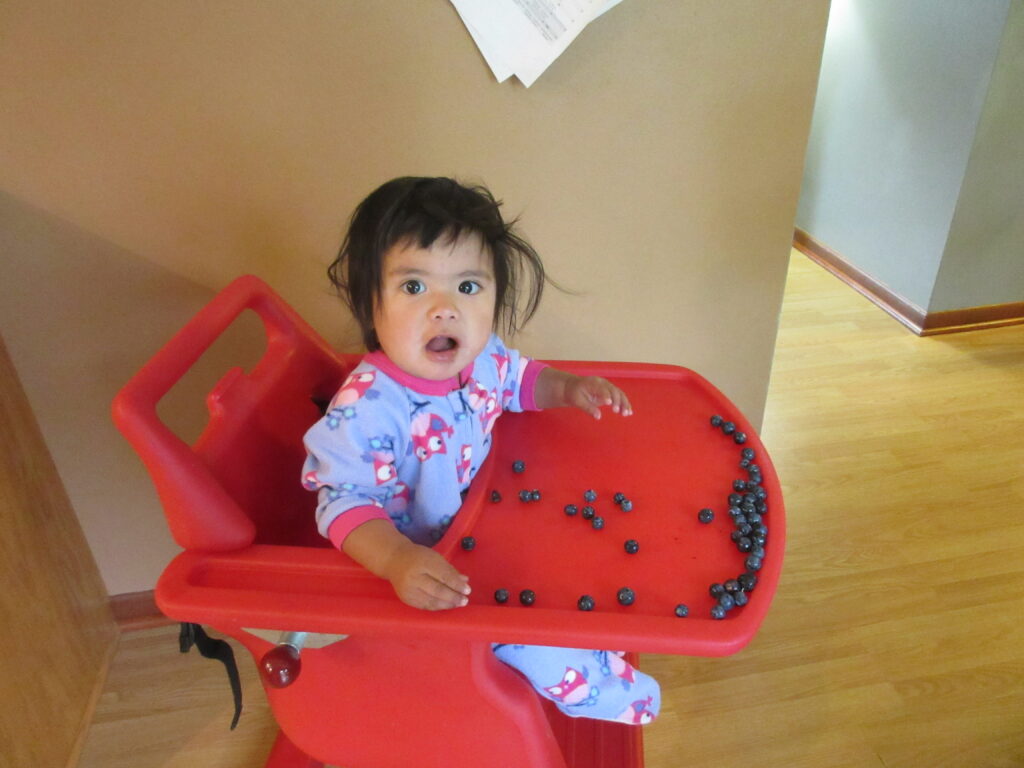Check out our latest video, which is on the same topic as this post: How to enjoy spending time with your kids.
Watch a little bit of Allison’s daily life and get some ideas on how to enjoy spending time with your kids.




Check out our latest video, which is on the same topic as this post: How to enjoy spending time with your kids.
Watch a little bit of Allison’s daily life and get some ideas on how to enjoy spending time with your kids.
I feel the need to preface this advice by admitting that I do not always enjoy spending time with my kids. Building relationships with your children and creating a home environment that helps those relationships flourish takes a constant effort, and I fail at it. Frequently. Sometimes, there is nothing I want more than to get away from them.
But it IS possible to have mostly good days, and to make your home a refuge that your family wants to spend time in. One of the biggest lies we tell ourselves about being a stay-at-home mom is that we could never spend that much time with our kids; we would drive each other crazy. Not true. The whole point of having kids is to spend time with them. If you don’t spend time with them, you won’t know them. If you don’t know them, you can’t have meaningful relationships with them. If you don’t have meaningful relationships with them, you can’t guide or influence or “parent” them, because they won’t care what you want think.
You can enjoy your kids. It might take some work, especially at first. But being at home with them can be every bit as fulfilling and stimulating and amazing as even the best job in the world. (And you’re the boss! Even better!)
If you’re feeling doubtful right now, I can relate. For the first ten years of my life as a mom, I worked a full time job, and I just knew that I could never stay home with my kids. But the bottom line is this: your time with your kids is what YOU make it. You are in control. If you want it, and you exercise a little bit of self-discipline, you can stay home with your kids all day and love it. So here’s all you need to know to get started: my top five tips – born of trial and error (lots of error) – for truly enjoying time with your kids.
And if everything goes wrong (it will, sometimes), and you have a terrible day, try to keep it in perspective. Tomorrow is always a fresh start. Forgive yourself. Forgive your children. Take a few minutes at the end of the day to honestly assess what you did well and what you did wrong, and resolve to do better next time. Remember that God is with always with you, cheering you on, drawing you and your children closer to himself, even during those terrible moments where nothing seems to be going the way you planned. A wonderful tool you can use to reflect back on the day and find God in it is the Ignatian Examen. He IS there, and he wants to help you!
What advice do you have for enjoying time at home with your kids? Share with us in the comments!
I have come to terms with the fact that I do not have time to write long, well-thought-out blog posts with beautiful photos.
It’s probably a stretch to say that I’ve ever written really well-thought-out blog posts with beautiful photos anyway.
I still feel sad and a little (just a little) bit resentful about it, but I feel almost like I’m being CALLED to write something here, even if it isn’t perfect.
So, rather than continue to stew about it and post nothing, I’m going to try sharing the stuff I’m thinking about, even if it isn’t quite the way I want it to be. I know that the message and mission of Radical Motherhood is important, and I’m praying for guidance on how exactly I’m supposed to share it.
So. I’ve been thinking a lot about trusting God lately. It’s an idea that’s pretty relevant to our current times, and it’s especially relevant to moms who are considering leaving a fulfilling career and income to stay home with their kids.
If you know that God’s got your back, it’s a lot easier to make tough decisions. You know, like the decision to cut your family’s income in half, spend all day every day with your children, and form a whole new identity apart from your work.
For most of my life, I’ve thought of trusting God as kind of a hope against all odds that he will stop bad things from happening, if I can manage to anticipate them and pray about them first. God, please keep my kids from getting sick. Please protect my husband’s job. Or, on the other side of it, as a way of getting what I want from God, if I’m good enough and pray hard enough, and my motivations are pure enough. God, I said a Rosary today. Please heal my friend.
That kind of trust never really felt like trust. Instead of worrying less, because I was trusting God to take care of me, I worried more. Was I praying correctly? Was I praying enough? Why would God answer my prayers, if even the saints had prayers go seemingly unanswered? How do I know whether God wants the same thing that I want, and if he doesn’t want what I want, am I ticking him off by continuing to ask for it? Am I actually changing his mind when I pray for something to happen? Is that even possible?
It doesn’t take much to prove that God allows hard things to happen to the people who love him. Look at the lives of the disciples. Look at the lives of the saints. Heck, look at the lives of the Christians in our own times. Misery and tragedy touch all of us, even the best of us. God asks a lot of his followers, and he tells us repeatedly that he does all of it for our own good. Sometimes, we suffer, and that’s part of his plan for us.
What I’ve learned is that, while God does want to know the desires of our heart, prayer isn’t about convincing God to do things for us, or to spare us from suffering. Trusting God doesn’t mean that you trust him to protect you from every bad thing, or to make everything easy for you, or to give you what you ask for. It means acknowledging that he’s smarter than we are, and he loves us even more than we love ourselves.
So what does it mean to trust God? Simple. It means that you surrender. You allow him to be God. You spend more time asking what he wants than explaining what you want. When a prayer goes unanswered, you trust that he has something better in store for you. When you suffer, you trust that he will give you the strength to keep going. You have confidence that whatever is going on in your life, he is using it for your good – your eternal good.
You can’t change God’s mind. You don’t need to. He’s never wrong. His plans are never bad. If he wants something for us, and we want something different, the odds are 100% that we are the ones who need to change our minds. To me, that revelation was such a huge relief. I can still tell God what I want to happen, and because he loves me, he will listen. But I don’t have to worry about trying to control everything by praying for it. All I have to pray is that God’s will be done, and that he gives me the grace to align my will with his.
If you’ve been asking God to protect you from something, or to deliver something good, or to make something easier, I challenge you to stop, right now, and ask for something else instead: Ask him to help you to trust him. Ask him to give you the grace you need to do what he wants you to do.
If you’ve been thinking about becoming a stay-at-home mom, but it seems like there are too many obstacles and too many sacrifices involved, ask God to strengthen your will – so you can break your attachment to your current lifestyle, to sharpen your mind – so you can come up with a transition plan that works, and soften your heart toward your vocation as a wife and mother – so you can put first things first without resentment or bitterness.
I follow several homeschooling moms online, and I’ve seen a LOT of “here’s how to homeschool” posts from them lately. I think they’re attempting to help other parents who have unexpectedly been faced with school closures, and I think that’s admirable.
But misguided.
I would love to think that one silver lining on the coronavirus cloud is that more parents will attempt homeschooling and fall in love with it. However, my advice to anyone who is suddenly at home all day with their children (or maybe still working full time and wondering how to keep up their kids’ education while school is closed) is to ignore all of those posts.
I’m already a homeschooling mom, and I don’t even want to homeschool right now.
I don’t think it’s fair to you, to your kids, or to homeschooling, to try to figure it all out in one month. Let alone a month like this one.
I don’t know about you, but despite my best efforts, I find myself obsessing over the coronavirus – be it watching the news or Googling it or talking about it or dreaming up worst-case-scenarios. Even when I’m not consciously thinking about it, it’s there, gnawing at the back of my mind. It makes me feel restless. Irritable. Make that very irritable. Exhausted. There seem to be a million things to do (make homemade hand sanitizer? research toilet paper alternatives? can a bunch of vegetables?) but I don’t want to do any of them. A million voices are out there promoting a million different ways to feel, opinions to have, facts to analyze, and supplies I should buy. I feel paralyzed.
Even though my family spends 90% of our time at home all year round, I suddenly feel trapped. Would I be able to do something like start homeschooling from scratch RIGHT NOW? Um, no.
Now, homeschooling does not have to be overly complicated. I don’t want to make it seem like you need any prescribed amount of preparation or education to teach your kids. Under normal circumstances, I think that anyone who wants to do it can homeschool their kids. But if you want it to work, you have to figure out how your kids like to learn. You have to figure out how you like to teach. You have to pick some kind of material to teach from out of the oodles of homeschool materials out there. You have to do it from a place of confidence and peace. You have to be able to observe, reflect, make adjustments, observe some more. Sometimes, you have to scrap everything and start over. I don’t think you can do any of that in such a short period of time, and I don’t honestly think it’s worth trying.
I say, give yourself and your kids a break. You all deserve a break. If you have extra time together, spend it doing something enjoyable. Watch a movie. Play a game. Talk about something.
I DO want other families to try living on one income, and homeschooling, and all of the other wonderful things we talk about on this blog. But I don’t want anyone who has lost their job indefinitely and/or had their school announce a month-long closure to think that this one month of insanity could be anything like the true experience of being a homeschool family.
This is not a season that is, for many of us, going to be productive in the traditional sense. There are a lot of things we would normally get done, like schoolwork, that are just not going to happen.
That’s okay.
Slow down.
Be unproductive.
I think we need to let go of the idea that time is only well spent if we have a worksheet or a report or a completed checklist to show for it. If the only thing our kids learn during our time in quarantine is to enjoy us, and to enjoy each other, would that be so bad?
Every day, several times a day, I think of something I want to write, but there is never any time. Sometimes it’s impossible, because one of the toddlers is crying or in immediate danger of choking, falling, or making a gigantic mess (approximately 95% of their waking hours). Then there’s homeschooling, and feeding people, and keeping a pathway shoveled through the toys and laundry. Most of the time, I really do love and find joy in taking care of everyone and everything at home, but it isn’t always easy to lay down my desires for the sake of the greater good. There are days when I serve my family (how to say this nicely?) not-so-joyfully. There are days when I really want to watch a grownup show on TV. Or go for a walk. Alone. Or relax, in silence, in the bathtub, without anyone coming in to use the toilet. There are times when I think about all the other things I want to do or could be doing, and it’s a struggle to maintain perspective. Even ten years after choosing to become a stay at home mom – nearly 20 years after first becoming a mom (!) – I have to continually recommit myself to doing it with joy and love.

When I came across the ideas of voluntary displacement and downward mobility in Henri Nouwen’s Spiritual Direction, I immediately thought of motherhood and how important both of them are in helping us stay faithful and joyful in our calling. More on that in a second. The author, Henri Nouwen, was a Catholic priest, pastor, and professor at Notre Dame, Yale, and Harvard. Then, at the height of his career as a sought-after Ivy League professor, writer, and speaker, he chose to travel to France to live and work in a community for disabled adults. He left everything he had worked his whole life to build to serve a group of people who are, in the eyes of the world, nobody. And he admits that it was hard; that everything in his nature wanted to cling to the prestige and honor and comfort of his old life.
I think there’s a parallel here in the lives of many mothers, especially stay-at-home mothers, who choose to leave a career and possibly a big chunk of their self-image to serve their families. To devote oneself to the care of children is, in the eyes of the world today, a pretty lowly occupation. It goes against our culture’s obsession with upward mobility – the idea that, in Nouwen’s words, “…the only way to go is up. Make it to the top, enter the limelight, break the record – that’s what draws attention and gets us on the front page of the newspaper and offers the rewards of money and fame. Our culture values ‘upward mobility’: staying on a secure career path, maintaining the status quo, appearing to others as an interesting person, succeeding in business, politics, sports, academics, or even spiritual practice.” Is there any lifestyle less glamorous than being a stay-at-home mom? Where’s the career path, the money? What interesting things do moms do, or think, or talk about?
Does what you do really matter if no one “important” sees or cares about it?

The way of motherhood – real, radical motherhood – is the way of downward mobility. It’s the way of Jesus. “It’s going to the end of the line, staying behind the sets, and choosing the last place.” Jesus lowered himself by not only becoming human, but by living in poverty and dying the death of a criminal. And he did so by choice – choosing to give everything for us because he loves us. We need to embrace downward mobility, as Jesus did. Unless we do it willingly – joyfully – we aren’t really taking up our cross and following him. Nouwen refers to this as voluntary displacement. “We are called to follow Jesus on the downward path of ministry and to go where God is leading, even if that place is ‘somewhere we would rather not go’ (John 21:18).” Voluntary displacement is what we do when we choose to leave what Nouwen calls the “net of the ordinary and proper.” When a woman leaves a good job, especially one that took years of education and training to earn, we often see it as a violation of what is “ordinary and proper.” How could she waste all of that time and money? What kind of example is she setting for her daughters? Aren’t women like her destroying the feminist movement? Wouldn’t her children be more normal if she put them in daycare (and school) like everyone else?
Wanting to do work that is unpaid and unseen is definitely outside the “net.”
But, as Nouwen writes, “Voluntary displacement unmasks the illusion that we have to ‘make it to the top’ and offers us a glimpse of a deeper spiritual reality. It puts us in touch with our own suffering and pain, our own woundedness and brokenness, our own limitations and powerlessness…The discipline of displacement calls us away from the comfortable place and the easy oasis.”

It’s easy, when you’re doing work that the world sees as worthwhile, to feel powerful and independent. To think that what you are and what you have belongs to you and is because of you. It’s much harder to feel that way when you’ve spent your entire day trying (and failing) to just get a shower in and brush your teeth. My children have taught me over and over and over again that I am limited. That I am broken. That I am very, very ordinary, and I need a lot of help just to make it through my boring little life. That God is the only thing keeping it all going, and without him, I am not even a speck of dust. Which, it turns out, is the very thing Jesus wants us to learn. Nouwen says, “For many people, displacement means persevering faithfully in their unspectacular daily life, leaving grand fantasies aside to be faithful to their ministry…”
Most of us aren’t called to riches, or fame, or even to raising perfect children in an immaculate home. We are called to know God, and love him, and recognize that without him, we are, quite literally, nothing. To find the beauty in the unspectacular. So, we persevere faithfully in our unspectacular daily life. We choose to leave the net of the ordinary and proper and serve those who have no power, no status, nothing of earthly value to give us. We stay behind the sets, take the last place in line, admit to our limitations and powerlessness. It will always be a struggle, sometimes at least, to renounce what the world has to offer. It’s easy to focus on what we could have had, could have been – even when we know that none of that is really what it seems anyway. The only way to embrace the downward path is to ask Jesus to help us; to help us lay down our lives for what we know he has called us to do – then we can live our ordinary lives with extraordinary joy.

The Litany of Humility is probably my favorite prayer. I say it often, because I NEED it often. Maybe it will help you on your downward journey too:
O Jesus, meek and humble of heart,
Hear me.
From the desire of being esteemed,
Deliver me, O Jesus.
From the desire of being loved,
Deliver me, O Jesus.
From the desire of being extolled,
Deliver me, O Jesus.
From the desire of being honored,
Deliver me, O Jesus.
From the desire of being praised,
Deliver me, O Jesus.
From the desire of being preferred to others,
Deliver me, O Jesus.
From the desire of being consulted,
Deliver me, O Jesus.
From the desire of being approved,
Deliver me, O Jesus.
From the fear of being humiliated,
Deliver me, O Jesus.
From the fear of being despised,
Deliver me, O Jesus.
From the fear of suffering rebukes,
Deliver me, O Jesus.
From the fear of being calumniated,
Deliver me, O Jesus.
From the fear of being forgotten,
Deliver me, O Jesus.
From the fear of being ridiculed,
Deliver me, O Jesus.
From the fear of being wronged,
Deliver me, O Jesus.
From the fear of being suspected,
Deliver me, O Jesus.
That others may be loved more than I,
Jesus, grant me the grace to desire it.
That others may be esteemed more than I,
Jesus, grant me the grace to desire it.
That, in the opinion of the world, others may increase and I may decrease,
Jesus, grant me the grace to desire it.
That others may be chosen and I set aside,
Jesus, grant me the grace to desire it.
That others may be praised and I go unnoticed,
Jesus, grant me the grace to desire it.
That others may be preferred to me in everything,
Jesus, grant me the grace to desire it.
That others may become holier than I, provided that I may become as holy as I should,
Jesus, grant me the grace to desire it.
by Merry Cardinal del Val, secretary of state to Pope Saint Pius X from the prayer book for Jesuits, 1963
I was recently asked if I had any advice to give regarding “co-parenting.” As in, divorced parents working together to “parent” their children. I’ve thought a lot about it, and I’ve decided that my advice is: don’t waste your time. It isn’t possible. It shouldn’t even be a word, let alone a topic of discussion. As a divorced parent of nearly 12 years, I can honestly say that all of my attempts to co-parent have failed, in a total and devastating way. Once you divorce someone, you pretty much remove whatever motivation they had to listen to you, make compromises with you, or care about your opinions. Trying to get them to impose YOUR rules in THEIR household is NEVER, EVER going to work. You and your children are just going to have to get used to two sets of rules and expectations at two different households, and you will have to let go of the idea that you can somehow control what happens at their other house. Will this cause confusion? Yes. Frustration? Undoubtedly. Will your kids want to move to the “fun” household just because there are fewer rules? You betcha. And the more you try to cling to your kids and your control over them, the more they’ll ignore your rules, idealize their other home, and want to leave.
But, if you’re like me and it’s too late for that, keep reading. I’ve got some ideas that will help.
I’m not saying that you should give up on establishing rules and boundaries for YOUR household. Nor am I saying that you should never speak up when you see or hear of outrageous or dangerous things happening at the other parent’s house. But a much better use of your time and creative energy than co-parenting is to:
It’s hard for me to imagine what it’s like for my kids to have two homes and two sets of parents. It really is like they have two separate lives, and I know almost nothing about the life they live at their dad’s house. When I get really frustrated about their behavior on a transition day, I try to put myself in their place and imagine what they’re going through. In the span of the hour it takes to get from one house to the other, their whole world becomes entirely different. At their dad’s house, they have different siblings, a different bedroom, a pet cat and dog, a different wardrobe, different toys, different rules about food and electronics, different friends, no school or homework or extracurricular activities to worry about, a stepmom, different grandparents and aunts and uncles, a different church…even a different personality. When my daughter is at my house, she scorns everything girly, but she’ll come back from her dad’s house with painted fingernails, braided hair, and feminine clothes that she can’t wait to show me.
So when my kids come home to my house after a weekend away, is it any wonder that they act differently or seem to forget all the rules we have here? I used to take it personally when they were aloof and wanted to spend time alone in their rooms, or when they called me by their stepmom’s name or disregarded our rules on electronics or snacks. But I’ve realized that they need time and space to adjust back to our version of normal. Give your kids a day or so to get back into the groove at your house without nagging or scolding them, and you’ll be amazed at how much more peaceful your house is. Refrain from grilling them about what happened, criticizing anything about their other home or parents, or correcting them when they break a rule that you know is different over at their other home. If you think you can do it sincerely, go so far as to acknowledge that you know it’s hard for them to go from one home to the other and apologize for putting them in this situation.
Kids need rules. However, what kids need even more than rules is to develop and listen to that still small voice called a conscience that alerts them when they’re about to do something wrong. I’m not going to claim to be an expert in how to do that, because my children – and I – are still a work in progress. The best, and for me, the easiest way to help kids develop a good conscience is to simply lead by example. Do the right thing, consistently, especially when it’s hard, and your kids will notice. If you’ve ever said a swear word in front of a toddler, you know how strong their tendency is to imitate us, and that goes for bad behavior as well as good. Tell the truth, and you show them the importance of telling the truth. Put the needs of others before your own, and you show them how to serve. Work hard, and you show them the value of hard work. Pray with them, and you show them the importance of developing a relationship with God.
Other ways to help your kids develop their conscience:
If you continue to struggle with the different rules and expectations, consider asking your kids what you can do to help the situation.
Don’t just assume that your kids will laugh this off and ask for all the rules to be eliminated. If you take them and their ideas seriously, they will usually do the same for you.
Are you a divorced parent? Share your feedback or co-parenting story with us in the comments.
I know there are a lot of moms who would love to stay home with their kids, but they – and their husbands – have doubts. Can we make it on one income? Will I be bored at home? Can I handle the stress of being the sole provider? Will we have to live on beans and rice? Will we still be able to retire someday? What will the kids think? What will our friends think? What’s the responsible thing to do? Sometimes, we just need a little reassurance from someone who’s been there, and for men, that reassurance means more if it’s coming from another man.
SO, I decided to interview my husband. He’s been doing the sole-provider thing for almost nine years, and he’ll be the first to tell you that he never thought he’d be able to make this work. At least, not on his own. But, with the help of God, the support of our families, and a little creativity, we continue to be blessed and thriving nine years (and five more children) later.

John: It’s been a dream of hers, and it’s been a dream of mine, for a long time, that we would be in a situation that we could do this. With her wanting to do it and approaching me about it, I thought it was a no-brainer. She put the pencil to it – how much is daycare, where can we find another $50. She did all the homework and figured it all out. It was what she wanted and what I wanted, and we’ve never looked back.
John: I think in the beginning the only thing that I might have been concerned about was her getting bored at home. She’s so good at her job, I was afraid that she might miss that and want to go back into the workforce.
John: I really don’t see any sacrifice. The only thing I can think of is when we first started, we got rid of our satellite dish, we went down to one car…and we rent, so we haven’t purchased a house since we’ve been doing this, but I know that we could do it, so I don’t think that’s a sacrifice. That’s about it, just a few odds and ends that were just a few monthly payments. We were able to find the money by not having daycare, not having the extra car payment and insurance, and my wife is very good at finding money.

John: Security for my children. I think growing up in the 60’s and 70’s like I did, it was such a wonderful thing that my mom was a stay-at-home mom, and I feel the same about my situation now. The kids don’t have to go and stay at someone else’s house or get dropped off at 6 am. The security that mom is always there – you can’t put a price on that.
John: Doctor’s appointments, picking the kids up from school, not having to worry about if one of the kids is sick, just simple things like that. Appointments and errands that she can get done if she wants to.
John: I guess I haven’t felt like I needed a plan. If it comes to that, I would find employment elsewhere. I don’t think that’s an issue. It’s never part of my plan that she would go back to work. I don’t worry about money.
John: I think the whole thing was based on that. In a worldly mindset, I couldn’t imagine this, to trust my lone income to give me all the things that I need for a growing family and take care of all the finances and continue to grow our family.

John: I’d say there’s so much more peace about the household. It’s very peaceful. It’s a lot more organized, and there’s no stress coming from job to home. I try to help out with the daily things, but she finds a lot of joy in cooking and in running the household. There’s less drama with the kids; more quality time with the kids.
John: First, I would pray about it. Seek God’s help on it, and maybe sit down and pencil it out. If it’s her heart’s desire, and it’s God’s will, you will be blessed. You will benefit tremendously from it. The lost income is such a minor part of it. I think about these children and how this is the only childhood they have. All the time spent in daycare. You just can’t put a price on this. They always say, you never say on your deathbed that you wish you’d had more time at work. I think God will bless you in a special way, and your children will come back when they’re older and they’ll treasure her, and they’ll say, look what Mom sacrificed for us.
Is your husband concerned about you staying home? Was he concerned at first, but you were able to overcome his objections? Share your story in the comments!
As relatively new bloggers, we’re not exactly sure if we did this right. However, we (are pretty sure we) posted a couple of our recent posts in a “Linkup” at one of our favorite blogs, A Wise Woman Builds Her Home. A Linkup is a special blog post where bloggers from across the world wide web can add links to their own posts on whatever topic the host requests. So, the post ends up being a big repository for many different posts from many different authors, all on one central topic or theme. It’s a wonderful resource for busy moms!
If you visit A Wise Woman Builds Her Home using the link below, or if you search the Wise Woman blog for the March 13 Titus 2 Linkup, you’ll find more than 85 blog posts from various blogs on topics related to Christian womanhood – faith, parenting, homeschooling, cooking – all kinds of helpful information.
Enjoy the Wise Woman Builds Her Home post, and let us know what you thought! Which post in the Linkup was your favorite (we won’t be offended if it isn’t ours…probably)?
This post is from April 2018, so we have now been homeschooling for almost a year. Here’s how it all started.
A couple of weeks ago, I wrote about our decision to start homeschooling our girls in high school. Our original plan was to start in the fall, at the beginning of the school year. Which is a logical time to start, rather than in the fourth quarter of the current school year…
We have a few good reasons for starting now, however. Our middle daughter (Alyssa) is the one we are currently homeschooling and definitely plan to homeschool through high school. She is a good student with good grades and test scores. But she has also had a tough year in other ways, and really wanted a change. We started to research homeschooling as a family, and now wonder how we ever thought that public school was the best option that we had.
If you are thinking about making a change, have a child struggling emotionally, socially, or academically, you should consider starting to homeschool, no matter what time of year it is.
I was nervous about taking her out of school, mainly because I was worried that we wouldn’t be “doing enough” for the rest of the school year. Since we have not homeschooled before, the whole process was new, so I had research to do.
 Starting homeschool in the middle of the year is not as scary as I thought it would be. Alyssa is adjusting and finding her interests. Once we feel like we have had time to figure out what she wants to study and how she wants to study it, we will start finding curriculum and activities for next fall. For now, we are just enjoying a slower pace and spending time together.
Starting homeschool in the middle of the year is not as scary as I thought it would be. Alyssa is adjusting and finding her interests. Once we feel like we have had time to figure out what she wants to study and how she wants to study it, we will start finding curriculum and activities for next fall. For now, we are just enjoying a slower pace and spending time together.
If you spend any time looking at blogs or websites or social media for moms, you’ve heard of self-care. It’s the idea that you have to take care of yourself first, or you won’t be able to take care of your family. Self-care ideas often include mom’s nights out, spa treatments, shopping, going on trips with friends, spending time alone in prayer or meditation, exercising, beauty treatments, and so on. Sometimes, self-care is even used as a reason for moms to stay in the workforce: if you need your work to feel “fulfilled,” then you need to keep working, because you won’t be a good stay-at-home mom if you’re feeling unfulfilled and resentful. Take care of yourself, keep your job, and let someone else deal with the kids all day.

When I read about self-care, my first response is, “YES! I want a spa day! And a mom’s night! And a 7-day Caribbean cruise vacation with my friends!” There are seasons when I feel like I NEVER get a break…it’s just day after day after day and night after night after night of taking care of everyone else, at the expense of what I think I need or deserve. I’m not against the idea of self-care at all – I long for it sometimes, like when I’m nursing a baby at 3 am (and then 4 am and 5 am), or when I look down at my feet and realize it’s been months since I even thought about clipping my toenails.
1. I, like most of you, live in EXTREME comfort compared to most of civilization past and present. I consider myself to be somewhat self-care-deprived, yet here are just a few of the things I enjoy on a regular (if not daily) basis: indoor plumbing with hot water, electricity, a climate-controlled home, comfortable furniture, an abundance of nice clothing, as much food as I want, enough time to shower, do my hair, and put on makeup every morning, easy access to childcare (if I need it), a phone and computer to communicate with anyone I want or access any information I need in an instant, grocery stores with processed/pre-made foods like bread, pasta, and canned goods that make meal prep a 30-minute process or less…that’s a lot of self-care that I don’t even recognize as such most of the time. If you’ve ever visited a third-world country, I’m sure you can think of many more ways that we’re pampered, even without setting foot in a salon.
2. Self-care feels good in the moment, but most of it doesn’t provide real, lasting refreshment. Have you ever been on a vacation and returned to work the following week feeling like you never left? Or returned from a day at the mall overwhelmed with guilt and remorse at the money you spent? Sometimes, I know that I need a break from my kids. If I want to avoid doing or saying something I’ll regret, I have to get out of the house and do something without my family. But that something can be as simple as picking up a few groceries, or having a cup of coffee with a friend, or walking through the thrift store. I don’t have to spend much money or time away to get the pick-me-up I need to come home with a better attitude. Thirty minutes of self-care that costs $5 or less is usually just as effective as an elaborately planned (and expensive) mom’s day or night out.

3. Self-care doesn’t make you feel as good about yourself as self-sacrifice. Take a few minutes to write down all of the sacrifices you’ve made for your family and friends this week. Even the little stuff, because that little stuff adds up. Did you spend Saturday morning doing laundry instead of catching up on social media? Did you watch The Spongebob Movie instead of your favorite Netflix show because your 8-year-old wanted a family movie night? Maybe you made rice crispie bars as an after-school snack when you could have been napping or spent your clothing budget on new gym shoes for your son instead of that cute sweater you found on Amazon. When you read over your list, what kind of person does it describe? Isn’t that exactly the kind of person you want to be? Don’t you kind of wish the list was even longer? Now think back to the last time you spent a night out with the girls, or went to a salon for a manicure and pedicure. Did you come home feeling refreshed, or were you exhausted and hungover? Did you appreciate your new manicure, or did you feel guilty about spending so much money on something that was gone after a couple of days of dishes or gardening? Sometimes, all the self-care you need is to remind yourself of all the hard work you do and who you do it for.
4. Most self-care is focused on our physical and emotional selves, and those are certainly important. We do need time to rest our bodies and feel happy and appreciated. However, the most effective self-care is spiritual, and you’re not going to find that downtown or at the salon or the bar. Instead of trying to carve out the time and budget for a tropical vacation or a spa day, figure out how you can spend more time with God. Are you going to church regularly? Do you find time for daily prayer? Do you ask God for help when you’re feeling overwhelmed? If you turn to God to meet your needs, including your need for self-care, He will always be there for you, and He will always satisfy you. For real.

Invite God into your frustration, your exhaustion, and your heartache, and he will give you true refreshment. I know how hard it is to make room in your day for God, and once you actually make room, it’s equally hard to figure out what exactly to say or do. Taking 15 minutes out of your day to pray sounds like the easiest thing in the world, and yet I can easily count how many times I’ve done it in the last month (because it’s zero).
Now, figuring out how to pray is a topic for another post – or a dozen posts – so I won’t try to do it here. Plus, I probably shouldn’t try to write about how to pray until I’ve actually figured it out for myself. I’m not exactly an authority at this point. However, there are a couple of resources I want to share because I really think they can help you if you’re new to prayer:
If you’re looking for a quick guide to getting started, try Matthew Kelly’s Prayer Process: https://dynamiccatholic.com/learning/the-prayer-process.
I also love Peter Kreeft’s (short) book on prayer called Prayer for Beginners: https://www.goodreads.com/book/show/325189.Prayer_for_Beginners.
A great way to start your day and turn EVERYTHING you do into a form of prayer is to say the morning offering: https://www.ewtn.com/Devotionals/prayers/morning2.htm. This is a perfect prayer for moms, because it’s super short and easy to say, and it turns all of the little things you do all day long, like mopping the floor and changing diapers, into offerings for God. I have it stuck to my bathroom mirror so I remember to say it every morning.
If you want to start right away with something simple, try the “Jesus Prayer.” It goes like this: “Lord, Jesus Christ, son of God, have mercy on me, a sinner.” You don’t have to go somewhere quiet or kneel down or even stop what you’re doing; you just say it. I say it (in my head) every time a toddler tests my patience, or I drop cereal all over the floor, or I yell at someone who really didn’t deserve it. I say it every time that voice in my head starts criticizing me because I never find time to pray. I think it’s a good start.
What’s your take on self-care? What’s the last thing you did that you’d consider self-care, and how effective was it?
